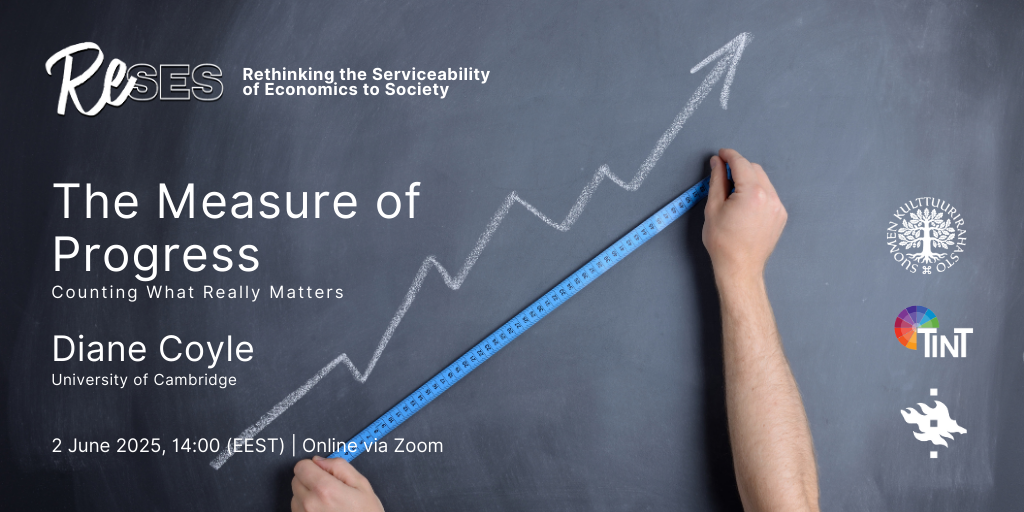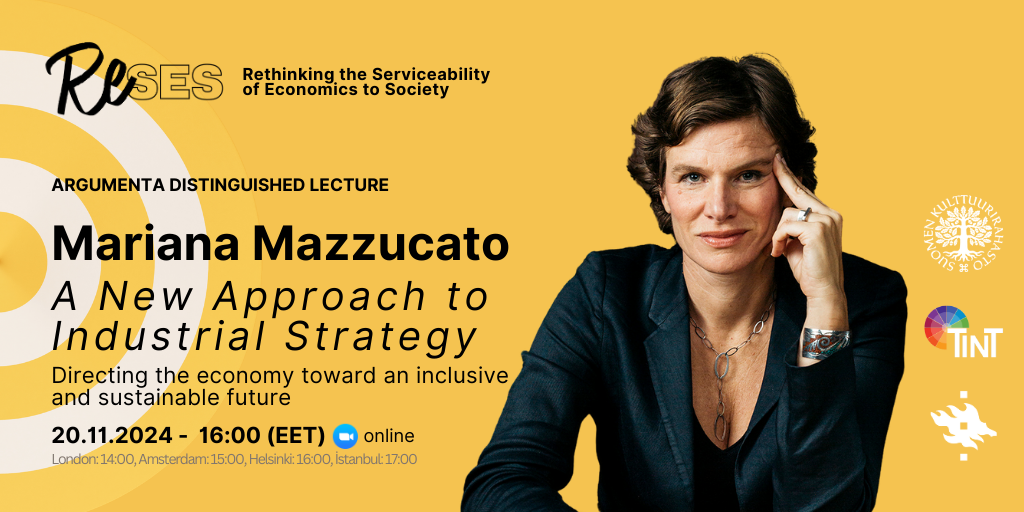Taloustieteilijöillä on paljon valtaa yhteiskunnassa. Mutta millaista taloustieteellinen asiantuntijuus on? Millaisen palveluksen taloustiede tekee yhteiskunnalle? Lähdimme selvittämään asiaa viime vuoden 2023 alussa alkaneessa ReSES-hankkeessa. Nyt on tullut väliyhteenvedon paikka.
Taloustieteilijöitä tarvitaan usein yhteiskunnallisissa tehtävissä. Kun hallitus suunnittelee budjettia, taloustieteilijät ovat usein paikalla. He arvioivat päätösten taloudellisia vaikutuksia ja ehdottavat säästö- ja investointikohteita. Heidän näkemyksiään kuunnellaan terveydenhoitoa tai koulutusta uudistettaessa. Eivätkä taloustieteilijät vain arvioi ja kuvaa, vaan he myös suunnittelevat uusia markkinoita. Heidän kädenjälkensä näkyy esimerkiksi päästökaupan, sähkömarkkinoiden, rahoitusinstrumenttien ja alustatalouden suunnittelussa.
Viimeisten vuosikymmenten aikana monet ihmiset ovat alkaneet kuitenkin kysyä, miksi kuuntelemme yhteiskunnallisessa päätöksenteossa nimenomaan taloustieteilijöitä. Miksi juuri heidän tuottamansa tieto koetaan tarpeellisena? Ja millä tavoin meidän tulisi suhtautua taloustieteelliseen tietoon ja sen rajoitteisiin? Suomessakin on keskusteltu siitä, millä tavoin taloustieteilijöiden taustayhteisö vaikuttaa ja saa vaikuttaa heidän tekemiinsä arvioihin ja ehdotuksiin. On ruodittu myös valtiovarainministeriön ekonomistien roolia. Jos ministeriön ekonomistien esittämät näkemykset suhdanteista poikkeavat merkittävästi muiden taloustieteilijöiden esittämistä arvioista, keitä meidän tulisi uskoa?
On kuitenkin hyvä muistaa, ettei taloustiedettä ole kuitenkaan valettu yhdestä muotista. Myös taloustieteilijät käyvät kriittistä keskustelua tieteenalan keskeisistä tehtävistä, menetelmistä ja päämääristä.
Lähdimme tutustumaan näihin teemoihin vuoden 2023 alussa alkaneessa ReSES – Rethinking the serviceability of economics to society –hankkeessa. Järjestimme parisenkymmentä erilaista esitelmää ja keskustelutilaisuutta sekä yhden vierailijaluentojen varaan rakentuneen kesäkurssin. Näissä tilaisuuksissa puheenvuoron saivat usein ihmiset, jotka uskoivat taloustieteen voimaan ja merkityksellisyyteen, puhuen tieteenalasta ja sen tulevaisuudesta.
Idealismia ja yhteiskunnallisiin ongelmiin pureutumista
Yksi ReSES:in lähtökohdista oli ajatus siitä, että taloustieteen asema on parhaillaan murroksessa. Ihmisille ei nykyisin riitä, että ekonomisti tulee kertomaan heille talouden toiminnasta, saati siitä kuinka heidän olisi soveliasta toimia. Suuret yhteiskunnalliset haasteet, kuten koronapandemia ja Ukrainan sota, asettavat isoja haasteita talouspoliittiselle päätöksenteolle.
Haastava maailmantilanne on saanut monet tutkijat puhumaan poliittisen mielikuvituksen tärkeydestä ja siitä, että myös taloustieteilijöiden tulisi kyetä avartamaan ihmisten mahdollisia horisontteja. Monet taloustieteilijät pyrkivätkin tukemaan erilaisia yhteiskunnallisia muutoksia. Esimerkiksi vuonna 2023 taloustieteen Nobel myönnettiin Claudia Goldinille, joka tutkii sukupuolten välistä taloudellista tasa-arvoa. Reilu vuosi sitten julkaistu Dasgupta-raportti pureutuu yhteiskunta- ja talousjärjestelmiemme ongelmiin, jotka aiheuttavat luonnon monimuotoisuuden häviämistä.
Vuoden aikana tuli osoitetuksi moneen kertaan, että se että henkilö on ekonomisti, ei tarkoita sitä, että hänen näkökulmansa olisivat väistämättä samankaltaisia elinkeinoelämän intressien kanssa.
Törmäsin myös yllättävän usein idealismiin. Se ei tullut aina tullut esille puheiden aikana, vaan osana kahvipöytäkeskusteluja. Monet heistä puhuivat siitä, mitä he olivat opiskelijoina toivoneet taloustieteen oikein olevan. Miten he olivat toivoneet, että taloustiede voisi tehdä myös yhteiskunnassa hyviä asioita – lisätä yhteiskunnallista tasa-arvoa, auttaa omaa maataan nousemaan köyhyydestä, antaa keinoja ilmastonmuutoksen ratkaisemiseen. Monet opiskelijat esittivät myös tällaisia näkemyksiä kesäkurssimme aikana. Näissä keskusteluissa kuului usein usko taloustieteen ja koulutuksen tarjoamiin mahdollisuuksiin. Usko siihen, että taloustieteellä voitaisiin tehdä hyvää.
Toisinaan puhuttiin myös siitä, että tieteellinen keskustelukulttuuri on ylipäätään muuttunut viimeisten vuosikymmenten aikana. Taloustieteessä, samoin kuin monilla muilla tieteenaloilla, on tehty paljon töitä inklusiivisuuden edistämiseksi. Esimerkkinä tällaisesta pyrkimyksestä käy esimerkiksi Wendy Carlinin ja Samuel Bowlesin luoma CORE Econ –hanke, jossa taloustiedettä opetetaan laajalle joukolle ihmisiä avoimesti saatavilla olevalla materiaalilla. Ihmisten lähtökohtien moninaisuus vaikuttaa suotuisasti myös tieteenalan kehitykseen.
Oman etunsa rationalisoijia vai luotettavan tiedon tarjoajia?
Kutsumamme puhujat tarjosivat monia näkökulmia taloustieteen moniäänisyyteen. Ha-Joon Chang piti aiheesta inspiroivan yleisöluennon, erottaen taloustieteen sisältä ainakin kahdeksan erillistä koulukuntaa. Nämä koulukunnat painottavat eri asioita ja antavat myös erilaisia politiikkasuosituksia. Mary Morgan analysoi sitä, millaisia taloudelliset indikaattorit ovat, ja miten niitä voidaan käyttää demokratian edistämisessä. Hän korosti, että tarvitsemme tietoa taloudesta, jotta voimme arvioida hallituksen tekemien poliittisten päätösten vaikutusta. Dani Rodrik puhui puolestaan uudesta teollisuus- ja elinkeinopolitiikasta ja siitä, kuinka yhteiskunnallinen vakaus vaatii sitä, että ihmisille on tarjolla hyviä työpaikkoja.
ReSESin tapahtumat vetivät sekä lavalle että yleisöön monia ihmisiä, jotka olivat kiinnostuneita taloustieteen moniäänisyyden lisäämisestä. Joissain tilanteissa tuli kuitenkin esille, etteivät kaikki taloustieteilijät kokeneet tällaista vuoropuheluun osallistumista kovinkaan relevanttina. Toisinaan myös kulttuuriset erot taloustieteen ja muiden yhteiskuntatieteilijöiden välillä tuntuivat aika suurilta.
Yksi syy näihin kulttuurisiin eroihin voi olla siinä, että jo taloustieteisiin valitut opiskelijat poikkeavat profiililtaan muista valtiotieteellisen opiskelijoista. Esimerkiksi joulukuussa 2023 Helsingin yliopiston valtiotieteellinen tiedekunta julkaisi hakijakyselynsä tuloksia. Siinä, missä valtiotieteellisen tiedekunnan opiskelijoista 58 prosenttia koki tärkeänä syynä, että ”tällä alalla voin tehdä hyvää yhteiskunnan eteen”, oli tällä tavalla vastanneiden määrä taloustieteessä vain 33 prosenttia. Tulokset ovat linjassa sen kanssa, miten Uskali Mäki kuvasi homo economicus -käsitteen keskeisyyttä taloustieteessä: tutkimusten perusteella jo taloustieteiden opiskelijat mieltävät itsensä omaa etuaan rationalisoivina ihmisinä muita opiskelijoita todennäköisemmin. Mäki kuitenkin lisäsi myös, ettei ole selvää, ajattelevatko opiskelijat näin luontaisesti, vai onko se jotain, minkä he omaksuvat opintojensa alkuvaiheessa.
Taloustieteen opiskelijoitakin on kuitenkin monenlaisia. Osa heistä voi kertoa hakeutuneensa alalle idealistisin perustein, kun taas osa kertoo, että raha ja työllistyminen ovat vaikuttaneet vahvasti heidän ainevalintaansa. Tällöin on tärkeä esittää jatkokysymys: millaista taloustieteen opettamisen tulisi olla? Millaisiin asioihin tulisi kiinnittää huomiota, jos toiveena on yhteiskunnallisen hyvän edistäminen? Tämä voi olla joskus haastava kysymys tieteenalalle, jonka lähtökohdissa viitataan usein omaa etuaan maksimoiviin yksilöihin.
Tieteenalojen välillä on eroja
Keskusteluyhteyden luominen nosti esille myös toisen hankalan kysymyksen tieteellisten kulttuurien välisistä eroista. Monet taloustieteilijät – ja myös sen opiskelijat – kokevat taloustieteen poikkeavan radikaalilla muista yhteiskuntatieteistä. Silloin on mahdollista päätyä tilanteisiin, joissa todetaan vain kohteliaasti, että kyllä, historian tuntemisella tai vaikkapa feministisen talousajattelun tuntemisella on yleissivistävää arvoa. Mutta kun keskustelu on ohi, opiskelijat ja tutkijat jatkavat työtään eteenpäin kuten aina ennenkin.
Jokainen tieteenala käyttää omanlaistaan kieltä ja käsitteistöään. ReSESissä nämä teemat tulivat esille erityisesti tapahtumassa, jonka järjestimme kotihoidontuesta. Siinä kysyttiin, millä tavoin meidän tulisi suhtautua taloustieteiden ja muiden tieteenalojen tarjoamaan tietoon tehdessämme päätöksiä kotihoidontuesta. Keskustelussa korostui, että taloustieteen tulokulma oli usein hyvin erilainen kuin niillä tutkijoilla, joiden tutkimusasetelmassa keskitytään enemmän ihmisten omien kokemusten tutkimiseen.
Kysymys erilaisten näkökulmien huomioimisesta on sidoksissa myös tiedepolitiikan kanssa. Eri tieteenalojen julkaisukulttuurit poikkeavat paljon toisistaan. Taloustieteilijöillä on perinteisesti ollut varsin yhteneväiset näkemykset siitä, mikä muodostaa tieteellisen erinomaisuuden.
On myös tärkeää tunnistaa, että osa tiedejulkaisuista suosii toisia enemmän moninaisista lähtökohdista ammentavien tutkimuksen julkaisemista. Jos tutkimusorganisaatioissa tutkijoita kannustetaan julkaisemaan ensisijaisesti vain JUFO3-tason lehdissä, saattaa tarkoituksenmukaisiksi koettujen aiheiden ja menetelmien kirjo kaventua suppeammaksi kuin jos tutkijoiden sallitaan julkaisevan monipuolisesti alansa eri lehdissä.
Monta asiantuntijaa on parempi kuin yksi
Hyvin monet henkilöt ovat kiinnostuneita taloudesta ja sen toiminnasta. Ja koska talous on keskeisessä roolissa yhteisöissä, on ihmisillä myös hyvin erilaisia tulokulmia sen ymmärtämiseen.
Demokraattisen päätöksenteon näkökulmasta olisi tärkeää ymmärtää ainakin jonkin verran sitä, miksi tietoa tuotetaan niin kuin sitä tuotetaan ja jääkö jotain olennaista tämän tuotetun tiedon ulkopuolelle. Esimerkiksi feminististen taloustieteilijöiden korostama hoiva ja sen merkitys on yksi tällainen teema.
Uskon itse siihen, että monista lähtökohdista kumpuava tutkimustieto tekee tutkimuksesta vahvempaa, murentamatta liiaksi sen uskottavuutta. Kun tutkimuksessa yhtä aihetta lähestytään eri näkökulmista, voivat ihmiset ymmärtää paremmin, että asiat ovat monimutkaisia. Taloustiede voi tuoda selkeyttä päätöksentekoon ja auttaa suunnittelutyössä. Toisinaan taas monimutkaisten asioiden esittäminen yksinkertaisena voi johtaa kuitenkin myös epätoivottuihin seurauksiin. Siksi asiantuntijuuteen kuuluu myös omien rajojen tunnustaminen.
Taloustietelijöiden silmät loistavat siinä missä kaikkien muidenkin, kun he pääsevät puhumaan aiheista, joihin he itse uskovat. Joskus on hyvin kiehtovaa seurata, miten ihmiset koittavat löytää keskustelun avulla yhteistä tietä kohti parempaa tulevaisuutta. Minulle tämä asia tuntui voimaannuttavalta huomata. Se tuntui täysin erilaiselta kuin aggressiiviset some-nokittelut ja suljettujen ovien takana laaditut poliittiset leikkauslistat. Ne valoivat uskoa siihen, että tieto tekee maailmasta paremman paikan.
Anita Välikangas on tohtorikoulutettava TINT:issä ja työskenteli ReSES-tutkimushankkeessa koordinaattorina. Kaikkien ReSES-tapahtumien tallenteet löytyvät täältä.
Toimittaneet: Jani Raerinne ja Teemu Lari


